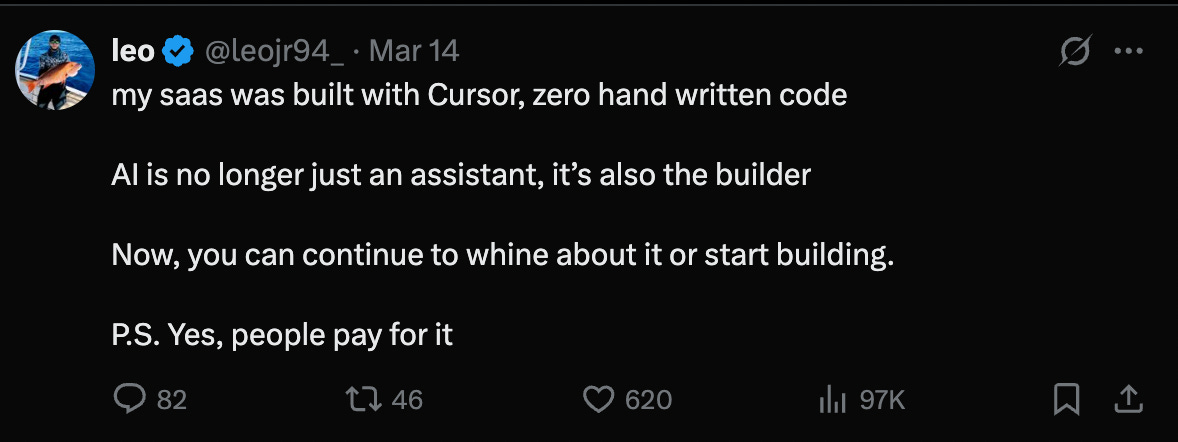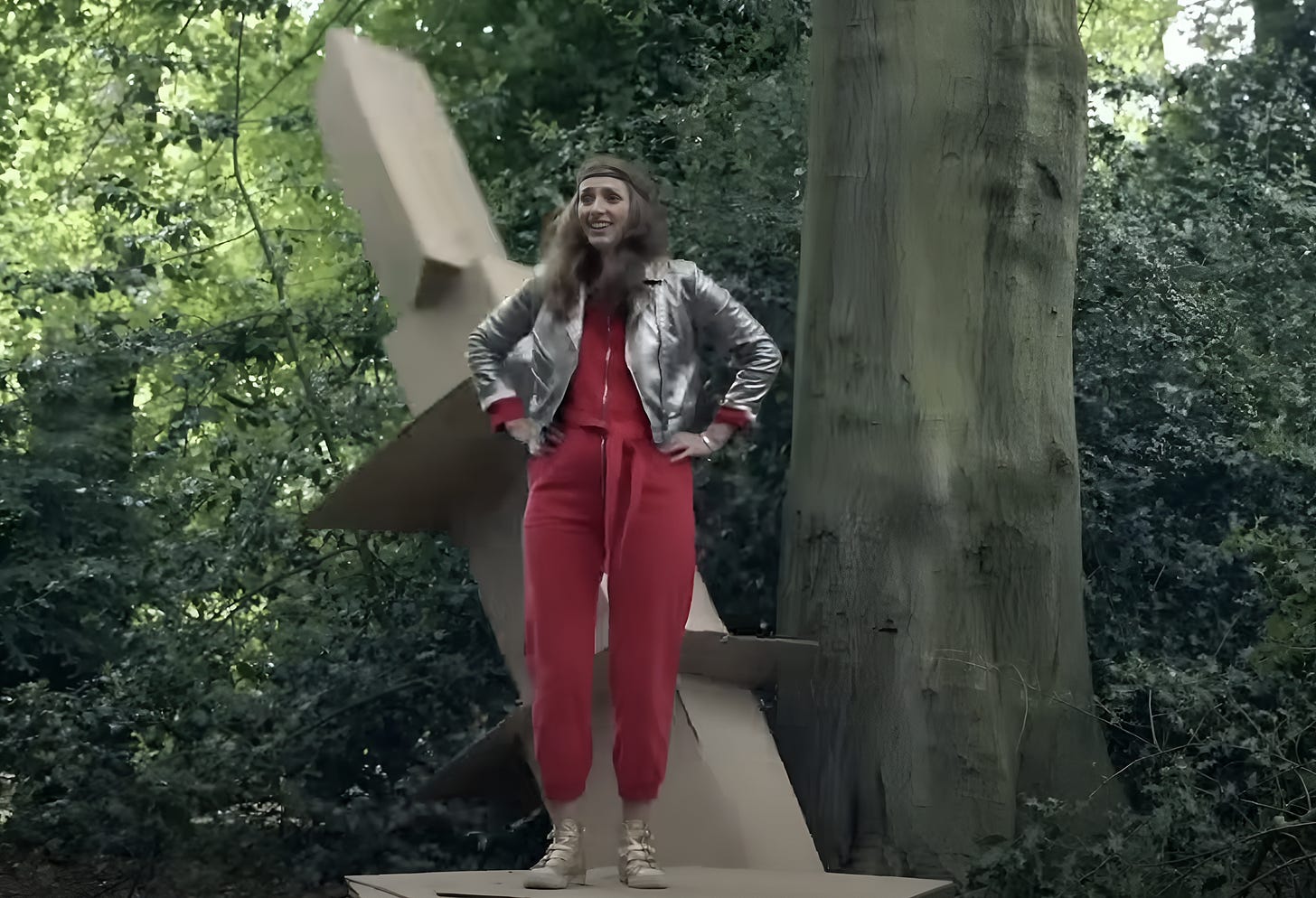why vibe coding gives off bad vibes
The Timeless Art of Building Things That Explode
day 2: the creak
04:03 a.m., Miami: Leo’s monitor glows red
guys, i'm under attack
It’s early spring morning in Florida and Leo, after coding his app for a few days, is drowning in a tsunami of code bugs. He’s a vibe coder—Karpathy’s term for people who describe an app in English, hit generate and ship whatever the AI spits out.
Earlier, a braggy comment brought him a few haters; I’m not a coder, yet I built a full SaaS in 24 h. But what Leo did next made haters multiply overnight. He claimed that the app is so good that people pay for it.
By 11:20 a.m Leo declares the attack is over, having completely skipped sleep for that night. He just “vibe coded his way out of the cyberattack, or at least he thinks so.” Leo is convinced that haters attacking his app are a sign of his growing success; when you are small nobody cares, the hate starts when you are growing.
But will turn for the worse for him soon, he just doesn’t know it yet…
In 1919, another man faced a similar problem. Arthur Jell’s tank kept troubling him. Well ok, not the tank itself although it’s leaking again. It’s those pesky neighbors, whining about the smell of molasses that give Arthur a headache. They had filed yet another complaint with the authorities.
Arthur, shivering on a cold Boston morning—14 January 1919, breathes the sigh of relief. He’s already dealt with this many times and he knows exactly what to do to repel his hateful attackers. He was about to have the worst day of his life, but like Leo, he hadn’t a clue…
day 1: the swagger
08:15 a.m., Boston Harbor: the tank exhales sickly sweet scent
On the morning of January 14, just 24 hours earlier, the tank had been filled with fresh syrup from Puerto Rico. Tank was moaning, groaning, and leaking as usual. Arthur’s solution? Order another coat of brown paint to hide the stains. Sympathy for the neighbors? None. As one resident later recalled:
Time after time we wrote letters about the leaks, but no one ever came to fix them. The tank just got a new paint job.
The neighbors’ kids didn’t mind; they collected the sweet drips in cans for years.
Naturally, most observers assumed the builder, Arthur Jell, was an architect or civil engineer. But they were wrong. Surprisingly, he was merely a treasurer. When the tank started leaking, did he investigate the cause or call an expert? Years later he testified:
Attorney: “Mr. Jell, did you have any architect or engineer inspect the tank?”
Jell: “No. There was no time; a molasses delivery was due.”
When Leo faced a similar crisis in 2025, he tweeted:
half the internet is trying to break my app
random things are happening—maxed‑out API keys, users bypassing the subscription, junk in the database
Who did he blame? Others, of course:
there are just some weird ppl out there



day 3 – the splash
12 : 40 p.m., Boston Harbor — screams
I woke up.
It was a scream, a piercing scream I will never forget.
On my left, a huge wave of dark, thick liquid came barreling through, picking up dogs, horses, carriages, cars—everything—on its way toward my house.
The thing I remember most was the sweet smell of molasses. That’s when it hit me: the molasses tank had exploded.
So recalls one Bostonian of the unseasonably warm morning of 15 January 1919. In minutes, a 4.5‑meter tsunami of syrup swept through the waterfront, killing 21 people and injuring 150.
Back in the present, Leo’s app reaches the end of its life—mercifully without claiming any:
i’m shutting down my app 😑
Cursor keeps breaking other parts of the code.
Leo’s app, like Arthur’s tank, didn’t have to collapse—had either man been trained as an engineer, software or civil. The warning signs—“weird people” and leaking molasses—wouldn’t have come as a surprise. Quite the opposite: they would have known these problems are inevitable. Both men, had they been engineers, would have been on friendly terms with the potential failures of their creations.
vibe engineering?
Long before a bridge opens, an engineer has daydreamed its spectacular collapse a dozen ways.
Nowhere is the role of good engineering more obvious than in aviation. For a century, engineers have learned to day‑dream crashes: black boxes record an airplane’s last words, windows are oval because rectangular ones caused three mid‑air blowouts, and thin metal skins display dents so a plane can keep flying—scarred, but safe.
This constant anticipation of catastrophe is precisely what engineering is about. It’s a discipline forged by understanding past mistakes—other people’s and one’s own. That mindset, the habit of learning from failure and preparing for it, is the step vibe coding lets non‑technical people skip entirely. Did Leo ever accept that vibes won’t save him from cyber‑attacks?
I’ll just rebuild it in Bubble, a more user‑friendly and secure platform for non‑techies like me.
Not really. He migrated to another AI coding platform. If the “weird people” stay away, he may convince himself the vibes are enough. But if problems return, he’ll discover what every seasoned engineer already knows: Business leaders keep assuming the code is the hard part. In practice, it isn’t. The hard part is the thinking—the logic—behind the code.
“Yes,” you might say, “but Andrej Karpathy, the engineering genius, champions vibe coding.” True—but vibes betrayed even him when he ventured into unfamiliar territory - frontend development:
I'm embarrassed to share it took me ~3 hours the other day to create and configure a supabase with a vercel app and resolve a few errors.
Someday AI may recursively self‑improve and surpass us in every domain. For now, models are only as good as what we can teach them, and much of what we know is tacit—we can know more than we can tell. That’s Polanyi’s paradox.
To build a plane, an app, or a bridge, you must be obsessed with how things work—and why they fail. No amount of vibe coding, seductive as it is, changes that.
Arthur never built anything again, but his disaster led to licensing and regulation in construction. Software fails faster, but it stains fewer streets. Today’s Leos still have a chance: master engineering principles and let AI handle the boring, boilerplate code. If Leo wants his next app to live, he’ll have to daydream its death first.



